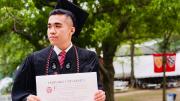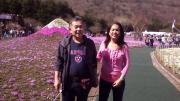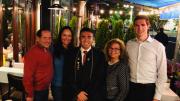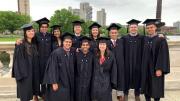The plan was to video chat his parents on the day of Commencement. His parents, who live in Japan, couldn’t be present, but Daishi Miguel Tanaka ’19 thought that if he gave his phone to a friend who would record his turn on the stage, they could at least watch him receive his diploma in real time. But on May 30, Tanaka didn’t receive the expected call.
“My parents actually did not tune in during the entire main day of Commencement, and I was very worried about what was going on,” he says. “A couple days later, after reaching out to cousins I have in Japan, I learned that my mom had been hospitalized. And she did not tell me this—one, because she was ill, and two, because she didn’t want me to worry. She had been suffering from a heart condition that I didn’t know about, and she couldn’t join me in my festivities because she was receiving treatment.”
Tanaka’s parents could not travel to their son’s Commencement because they are legally barred from entering the country and will be until 2026. The family immigrated to Los Angeles from Japan in 2004, when Tanaka was six years old, because he and his mother, who are Filipino, “faced a lot of discrimination based on our heritage.” At the time, immigration laws required that Tanaka and his family wait 25 years for a legal pathway to citizenship. “That meant 25 years of growing up in a country where I didn’t feel at home, where I didn’t feel I belonged,” Tanaka says. “So we decided to overstay our visas, and we became undocumented.”
Through the Deferred Action for Childhood Arrivals program (DACA)—an Obama-era executive order that provides protection from deportation and a Social Security number for undocumented people who were brought into the U.S. before the age of 16—Tanaka is able to legally live and work in the U.S. His parents, however, were not.
When Tanaka returned home from his freshman year at Harvard, he found his parents “living in a garage, working under the table at an elderly care facility for $6 an hour, receiving no health care and essentially no rights as workers or human beings because they were undocumented.” That summer, they decided to return to Japan, where they could retire and receive health care. “I didn’t want them to leave, because they were my only sense of home in the U.S.,” Tanaka says. “But I also understood that it was the best thing for them. They gave up a lot of their physical health working very difficult manual jobs in the U.S. as undocumented workers. So I spent all my summer savings for their self-deportation tickets, and ever since then I have been living in the U.S. by myself.”
Because Tanaka’s parents accumulated more than 180 days of unlawful presence in the United States, they face a 10-year ban on re-entering the country. DACA has a provision through which recipients can apply for advance parole to leave the country and return—but students can no longer utilize this provision, following the Trump administration’s 2017 order to rescind the DACA program. At the time, then-President Drew Faust denounced the decision, calling it “cruel” in a letter to the Harvard community and vowing to advocate for continuation of DACA. Although DACA recipients today remain protected by the courts, the Trump administration’s 2017 order halted the approval of advance-parole requests. This has affected a number of Harvard students: Jin Park ’18-19, who was named a Rhodes Scholar last fall, does not know if he will be able to re-enter the country once he leaves to pursue his studies at Oxford. And if Tanaka leaves to visit his parents in Japan, he would not be allowed to return. And so he has not seen his parents since they left in 2016—and most likely will not be able see them again until 2026.
“I didn’t really know how to process that,” he says of his realization that his mother had been hospitalized without his knowledge. It felt like another manifestation of his years-long separation from his parents, like his weakening grasp of Japanese, or the increasing difficulty of discussing with them parts of his Harvard experience like theses and issues in political theory. “All I do know is that it’s all connected. She really pushed her body physically when she was working as an undocumented worker in the U.S., and her body’s starting to give out.”
Of the activities that make up the three days of Commencement week, some are explicitly family-oriented, like a reception at the Science Center Plaza. But even at events that were not officially geared toward families—like the Commencement luncheon, or informal gatherings of his friends’ parents—it was impossible not to feel his parents’ absence. “Throughout the three days of Commencement week, it’s expected that you bring your loved ones to events and spend time with them,” Tanaka says.
Tanaka did what he could to include his parents in the festivities. After the ceremony, he mailed them a copy of his diploma, memorabilia, and photos, which they used to decorate one of their walls at home “as almost like a shrine for me,” Tanaka says and laughs. “So they have something physical they can see and hold.” And at the end of each day of Commencement week, as other students said good night to their families, Tanaka would call to say good morning to his parents, who were just waking up in Japan. “I was definitely emotional. I cried a lot talking to them, because I miss them,” he says. He remembers trying on his cap and gown for the first time and crying when he looked in the mirror, both because his parents could not see him in person, but also because “I knew that wearing the cap and gown I was representing them, and they were there based on the sacrifices they’ve made for me to get here.”
He was able to invite some other people to Cambridge to celebrate with him: his host family—Harvard alumni with whom he has spent holidays and breaks—and his former high-school Spanish teacher, who inspired him, among other things, to apply to Harvard. “It was a really beautiful moment when we all went to dinner Thursday night after Commencement and we celebrated what we were able to achieve together, which was my degree,” Tanaka says. Harvard’s financial-aid office funded travel for Tanaka’s guests because his family could not make it.
Beyond that funding, Tanaka believes there wasn’t much more Harvard could have done to improve the experience, except perhaps connecting him to other students in similar situations so they could spend time and attend events together.
But Harvard’s programming is not really the issue. For Tanaka, the problem is deeper and more structural: U.S. immigration policy. He wrote his thesis about the imperial relationship between the United States and the Philippines, and what the U.S. owes to migrants affected by this relationship. He will be spending the next year working in a public service fellowship in San Francisco on immigration reform.
“But that’s kind of—regardless—” He pauses, takes a breath. “I can’t see my family. So I definitely want to encourage policy change to make sure that other students and other immigrants can live in the U.S., a place they call home, and also be able to travel and be together with the people they love.”












